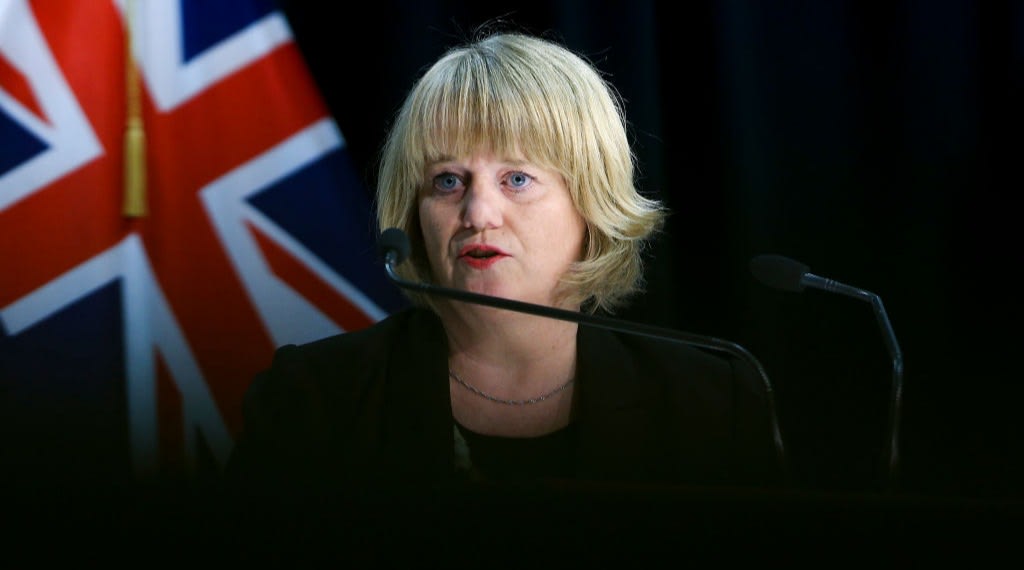Pharmac boss faces up to sick protesters
Health & Science
The head of the government’s drug-buying agency says they would like to have the budget to fund pricy gastrointestinal drugs like Stelara and Entyvio. ‘We’re on the same side,’ she tells sufferers.
At just 23, Danielle Barber has had to make the difficult decision that she will never have children.
The Christchurch nursing student was diagnosed four years ago with Crohn’s disease that has landed her repeatedly in hospital, required a subtotal colectomy and a colostomy, disrupted her studies and forced her to reconsider her plans for her life.
“I have decided not to have my own children, and that is a personal choice,” she said. “I think that is one of the things young females who have had to go through these invasive surgeries have to think about it.”
Hers is one of the “heart-rending” stories that Pharmac chief executive Sarah Fitt has heard and read in past weeks. Today, Fitt will meet Barber and other sufferers as they deliver a 30,400-signature petition for inflammatory bowel disease drug funding.

Crohn’s and Colitis NZ expects up to 100 people – inflammatory bowel disease sufferers and their friends and family – to gather outside Pharmac’s office in downtown Wellington today.
Fitt plans to talk with them. She has no good news to offer them on funding the two drugs they want, but wants to reassure them that she is hearing their concerns, and shares their hope to fund more IBD drugs in due course.
“We’re on the same side,” she said. “Some of the severe cases are pretty heart-rending. Some of them are quite young, and the effect on their lives is very severe; if affects everything in their lives on a daily basis.”
The group will then walk to Parliament, to deliver their funding petition to Act Party leader David Seymour.

Petition organisers and signatories are equivocal over who they blame for delays funding the drugs they want, the biologics Stelara and Entyvio.
In part they are concerned about constraints to the Government’s health budget; in part they take issue with Pharmac’s funding priorities.
They offer little criticism of the prices sought by the two pharmaceutical companies that make the drugs. The NZ subsidiary of US-based multinational Janssen Cilag, which makes Stelara, is a sponsor of Crohn’s & Colitis NZ. Tokyo-based Takeda, which expects MedSafe approval this month for its drug Entyvio, is also in talks to sponsor the patient support group.
“I just want to speak out at Parliament to put faces to the numbers. We’re actual people. We’re not just dollar figures that they can’t afford.”
– Jessica Port
Sarah Fitt, for one, suggested the health budget, the Pharmac funding priorities and the drug companies’ revenue expectations were all factors in deciding whether the drugs will be funded.
“Both drugs are on our list waiting to be funded, subject to budget availability,” Fitt said. “The main thing that can change is the companies’ asking price. These are relatively expensive medicines that would help a lot of people, so price is critical.”
There are about 20,000 people being treated for Crohn’s disease in New Zealand. Entyvio, a first-line treatment, could be an option for many of them; Janssen’s product Stelara is a third or fourth-line option for the 300 or 400 people like Danielle Barber for whom all else is failing.
Janssen’s parent company Johnson & Johnson, which makes everything from Band-aids to hip replacements to trial Covid-19 vaccines, forecasts earnings of more than US$82 billion (NZ$124b) this year.
It lists Stelara at $35,000 per patient, for the first year; it then reduces to $27,000 a year after that. Pharmac has a record of negotiating an average 50 percent discount on list prices, but many of those discounts are on products that have come off patent.
“We manage the budget on behalf of the DHBs,” Fitt said. “If they wanted to give us more money, they could.”
Crohn’s disease sufferer Jessica Port, 34, doesn’t really care what’s causing the delay, or where; she said she simply wanted to see the drugs funded.
Four months ago, Port was approved for a so-called compassionate supply of the unfunded drug Ustekinumab, sold under the brand name Stelara. She was the last one.
She is speaking to the group’s rally on the forecourt of Parliament.

After a 13 year battle with Crohn’s Disease in which she has had more than 30 surgeries and faces losing her bowel, she and her doctor say the early signs are promising that her body is responding well to the drug.
“The last 13 years of my life have been nothing,” she says. “I’ve lost that part of my life because I’ve been so sick. I haven’t been able to work, I haven’t been able to start a family, I haven’t been able to do anything, really.
“I just want to speak out at Parliament to put faces to the numbers. We’re actual people. We’re not just dollar figures that they can’t afford.”
Janssen has just hired one of New Zealand’s top lobbying firms, SenateSHJ, whose offices are a couple of blocks away from Pharmac, to argue its case in the political and public arena.
A Sydney-based spokesperson for the drug company said Janssen was aware of Crohn’s & Colitis NZ’s funding petition and march but, “as we respect CCNZ’s independence in conducting these activities and having their voices and concerns heard, we will not be attending the march”.
“New Zealanders are missing out on publicly funded treatments that are available as standard of care overseas in countries with comparable health systems and economic status.”
– Janssen
Janssen NZ is a member of industry group Medicines NZ and supports the association’s position that the current medicines funding model, while not broken, is no longer fit for purpose.
“As a result, New Zealanders are missing out on publicly funded treatments that are available as standard of care overseas in countries with comparable health systems and economic status,” the Janssen spokesperson said.
“Renewing New Zealand medicines policy and an independent inquiry into Pharmac could address this and other issues raised by stakeholders.”
“I would like to see Pharmac starting to champion for New Zealand patients, and for access to these medicines – not just saying, we do a job with the budget that we have.”
– David West
Takeda, which sells the drug vedolizumab under the brand name Entyvio, is expecting MedSafe approval for its drug – and will then negotiate for funding.
Pharmac’s Gastrointestinal Subcommittee has rated Entyvio as a high priority for funding. But the final ranking will be decided by the Pharmacology and Therapeutics Advisory Committee, which has not yet confirmed whether it is downgrading the priority to medium.
Prime Minister Jacinda Ardern has promised an independent inquiry into Pharmac’s funding model. But Takeda NZ general manager David West said the problem was with the government’s health budget.
“Quite honestly, it simply comes down to the Budget that is available to Pharmac,” he said. “I would like to see Pharmac starting to champion for New Zealand patients, and for access to these medicines – not just saying, we do a job with the budget that we have.
“Only about 5 percent of the Vote Health Budget in New Zealand is directed to pharmaceuticals. If you look at Australia it’s about 12 per cent, if you look at Italy it’s 18 percent, if you look at Japan it’s 20 percent. We are woefully behind other OECD countries.”
He agreed that Takeda and other companies were turning a profit on the drugs they sold, but said they were reinvesting those funds in developing more drugs. “We’re in the business of extending and saving lives. Any business has to be profitable.”
West said the Crohn’s & Colitis NZ petition, and the march on Pharmac and Parliament, was part of a groundswell highlighting the need for more drug funding. “I’ve spoken to them and we wish them well.”
He said Takeda NZ was not a sponsor of Crohn’s & Colitis NZ, but was in talks with them to provide some financial support.





